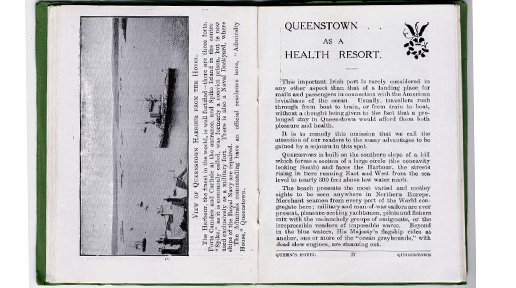In May 1915, after a German submarine torpedoed the RMS Lusitania killing nearly 1,200 civilians off of the coast of Queenstown, Co. Cork (now Cobh) a mob of angry Irish locals surrounded Queen’s Hotel (now Commodore Hotel). The rioters were calling for the hotel to be burned to the ground.
Inside, deep down in the wine cellar, hid Otto Humbert, the German-born owner of Queen’s Hotel. He was down there with his family for three days before protesters settled down, when he was able to flee on a ship to New York.

The cover to the 1912 pamphlet on the Queens Hotel.
Germany had declared the seas around the UK to be a “zone of war,” and they tried to justify their actions by saying the RMS Lusitania was carrying hundreds of tons of war munitions. They were in breach of international law, however, as the Lusitania was a non-military ship carrying civilians, and they had shot without warning. Though Humbert was not personally involved in what happened, his German nationality aroused much anger from those on shore, who had witnessed the horrible tragedy.
Read more: Playing 'Yankee Doodle' on the church bells in Cobh, County Cork
A New York Times article dated May 30th 1915 had the headline, “Forced From Own Hotel” and subheadline, “German-British Subject, Antagonized by Lusitania Survivors, Coming Here”
The article reads: “Otto Humbert, owner of the Queen’s Hotel, Queenstown, a naturalised British subject of German birth, sailed from Liverpool today for New York.

The beautiful old Queens Hotel.
“A number of the Lusitania survivors were taken to Mr. Humbert’s hotel upon their arrival at Queenstown. His origin aroused antagonism and he became the target of bitter criticism on the part of some of the survivors and their friends. His behavior has been above suspicion, but his presence in the hotel, where military and naval officers make their headquarters, caused protests. Consequently Mr. Humbert decided to leave.”
The hotel opened in 1854 and had several owners before it was passed on to the Humberts. Otto Humbert was the hotel’s most notable proprietor, as he took over during WWI; he put focus on attracting the lucrative passenger line traffic that frequented Cork Harbor, which the hotel directly faces. Humbert had electricity and phones installed in the hotel as well as an attractive, American style bar on the ground floor. In the back, he had stables for dogs and a garage installed for vehicles of the guests. In its day, the hotel had an “upper class” clientele.
Today, the beautiful and stately Commodore Hotel doesn’t seem to be a far cry from what it once was, as the structure and interior has been carefully preserved.

/uploads/assets/FT5S_2_Modern_hotel.jpg
An old pamphlet for the hotel from 1912, shortly after Humbert took over, reads: “This charming First-class Hotel is splendidly situated opposite the Promenade (where a Band plays during the Summer) and two minutes from the Landing Stage and Railway Station, with a fine view of the famous Harbour. The magnificent newly-built Cathedral is also only a few minutes’ walk. The Hotel - which is now under new management - has been entirely re-furnished and re-decorated, and telephone and electric lights have been installed throughout...As a new feature a lounge and American bar have been added. Also the sanitary arrangements have been entirely renewed, which leaves the department in a most perfect condition.”
Read more: Why do we care about the Titanic more than the Lusitania?
The pamphlet also contains a key with international telegraph codes for visitors to use while making reservations. For example, a telegraph saying “Tomorrow Belab Pass Matin” means “reserve two single bedrooms for one night, arriving between 8 am and noon.”

The American Bar.
While the Humberts hid in the wine cellar, Lusitania survivors were being brought ashore. An English woman who was in Queenstown on a holiday commandeered the hotel and transformed it into a temporary hospital to accommodate the survivors. Her husband was away fighting the war in India at the time. Today, the Commodore Hotel has a copy of the letter she wrote to her husband, detailing all that she did to help the survivors.
Ironically, in the 1912 pamphlet, the hotel advertises itself as a perfect “health resort,” especially for the winter time. It says that while many visitors are just passing through, a prolonged stay “would afford them both pleasure and health.”

Pages from the pamphlet describing the heatlh resort.
“The climate is remarkably mild and equable, and, at the same time fairly dry and tonic, and is especially suitable as a winter and spring residence for persons with delicate chests, to sufferers from chronic catarrhal throat affection, and to convalescents from acute diseases,” it says. “It is particularly appropriate as a seaside resort to persons requiring a soothing and sedative atmosphere.” The advertisement compares the temperatures to those at Torquay, a noted winter health resort in the south of England.
Along with the natural and climatic advantages of being built on the southern slope of a hill facing the harbor, the poetic pamphlet boasts “the most varied and motley sights to be seen anywhere in northern Europe,” referring to the beach: “merchant seamen from every port of the world congregate here; military and man of war sailors are ever present, pleasure seeking yachtsmen, pilots and fishers mix with the melancholy groups of emigrants, or the irrepressible vendors of impossible wares.”
The resting place of many who died in the Lusitania tragedy is located in the Old Church Cemetery just five minutes from the Commodore Hotel.
The hotel is bursting at the seams with history and stories; if you pay a visit to Cobh, consider the Commodore if you want to feel as though you’ve stepped back in time. You’ll notice that in its core, not all that much has changed since Otto Humbert took refuge in the wine cellar.

Beautiful old dressing rooms.




Comments